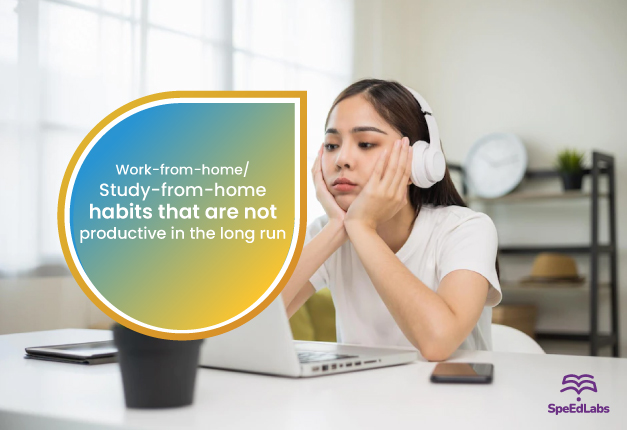Many of us have been obliged to work from home due to the coronavirus pandemic. Even after the covid-19 situation is resolved, some companies are considering making this new normal a standard practice.
Working from home isn’t a new concept. It has been an optional choice in most organisations for years, with employees able to choose it whenever they need to. However, the practice has recently become more of a compulsion.
Although there are some obvious advantages to working from home, such as greater flexibility, the disadvantages of this practice may outweigh the advantages in the long run. It’s all too easy to get caught up in the trap of being busy but not productive. Particularly if you work from home.
Whether you work full-time as a corporate employee from home. Whether we’re trying to start a small business on our days off or working from home full-time, we’re all vulnerable to the pitfalls (and pratfalls) of working from home.
Habits That Make Work From Home Less Productive
- Working on your couch – or, worse, your bed – can be too tempting to resist. You and your company are deserving of some solid, sacred working space.
- There will always be an underlying sense of being out of sync if your home office or workspace is not congruent with your goals.
- It’s more difficult to draw and maintain a line between work and personal life. This is especially true for those of us whose jobs require us to communicate with clients and collaborators who are located in different time zones.
- If you don’t leave the house regularly, your grooming may suffer. Yes, no one will notice if you haven’t showered in a few days. They won’t even notice that you’ve been wearing the same pair of jeans for three days. In addition, a lack of pride in one’s appearance can have an impact on one’s productivity and performance.
- When you work from home, you may not think about lunch planning.
- People in your life – your partner, spouse, children, and friends – believe that because you work from home, you are available to attend to whatever whims they have. Worse, they may believe that what you’re doing isn’t as legitimate as a regular 9-5 job.
- Your sleep routine has been completely thrown out the window. When working from home, people tend to work at home and also work for the office.
- You’re too tired to relax and get your day started gradually in the mornings or to wind down in the evenings because of your crazy sleep and work schedule.
- You don’t have a strategy or system in place to ensure that you have enough time to complete your work projects. If you’re being honest, you haven’t given yourself enough room to turn your work’s future dreams into reality.
Other Ill-Effects Of Working From Home
The company culture is being lost
A set of values and behaviours that contribute to the business’s unique social and psychological environment is referred to as company culture. The culture of an organisation is critical for fostering employee loyalty and a sense of belonging to achieve common goals.
The longer people are separated, the more a company’s culture is diluted and values are impacted.
The threat of a cyber-attack
Client information can also be leaked and misused when working from home. According to one respondent in a recent CNBC survey, phishing and other cybercrimes have increased by 40% at their company.
We are far more vulnerable to cyber attacks than we might have anticipated without the security protections that office systems provide, such as firewalls and antiviruses, and our increased reliance on technology.
Lack of designated space
Even if individuals can overcome the creative and technological obstacles, an ideal workspace in an Indian home is lacking. Most households lack studies or spare rooms for long-term remote work, and millennials who live in paying guest-type accommodations may lack the freedom to install the necessary infrastructure.
Consequences for mental health
The pandemic’s impact on our social lives has resulted in a great deal of stress, anxiety, and loneliness.
According to a recent survey on the impact of working from home on employees during the lockdown, the majority of respondents believe that work has become more “stressful and lethargic” than working in an office.
The overall mental wellbeing has been distorted as a result of longer working hours, increased workload, and a lack of work-life balance.
Key Takeaways
The working population which has been working at home has adapted themselves to this practice. But, there can be ill effects that will intensify in the long run. Hence, when considering the two options of work from office- or – work from home, many factors need careful consideration.
Also published on Medium.
